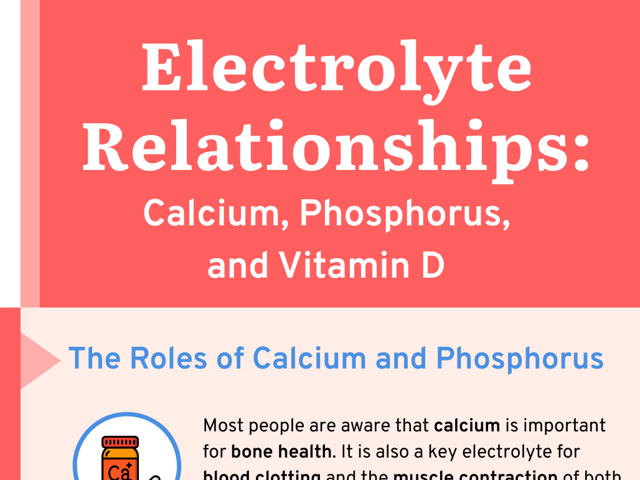
Electrolyte Relationships: Calcium, Phosphorus, and Vitamin D
Electrolytes are responsible for a number of different functions in the body, ranging from muscle contraction to hydration. While they are independently important, they also can impact levels of other electrolytes in the body. In another blog, we looked at the electrolyte relationships of sodium and potassium. This post will focus on calcium and its relationship to phosphorus and Vitamin D.
You can find discussions about other electrolyte Relationships in two other blogs:
The Roles of Calcium and Phosphorus
Most people are aware that calcium is important for bone health. It is also a key electrolyte for blood clotting and the muscle contraction of both skeletal muscles and cardiac muscles. This is why consuming foods and drinks with high levels of calcium is often recommended. Phosphorus is also mainly found in the bones and additionally is the main anion inside the body’s cells.
The Relationships of Calcium, Phosphorus, and Vitamin D
Calcium has an inverse relationship to phosphorus. This means that as levels of phosphorus in the blood rise, levels of calcium in the blood fall because phosphorus binds to calcium reducing the available free calcium in the blood. On the other hand, calcium has a similar relationship to vitamin D, which means that when vitamin D rises, calcium also rises. Of note, the levels we are referring to are the levels of free calcium in the blood and not calcium stored in the bones.
Parathyroid Hormone
Calcium is regulated by the parathyroid, which releases parathyroid hormone (PTH), as well as the kidneys. When calcium levels are low, PTH is released to break down bones and allow the calcium stored in the bones to be available in the bloodstream. PTH also activates vitamin D, which encourages additional calcium to be absorbed from the digestive tract and encourages the kidneys to retain more calcium while excreting phosphorus.
Other Considerations
On the other hand, when calcium levels are high, vitamin D supplements should be stopped to discourage increased absorption of calcium. Additionally, when phosphorus levels are high, patients may be encouraged to take an antacid containing calcium, which will bind to the phosphorus and prevent it from being absorbed by the digestive tract. This is why it is important to monitor all three elements—calcium, phosphorus, and vitamin D - in patients with confirmed or suspected kidney disorders, parathyroid disorders, or weak bones, as the relationship between these organs and electrolytes are tightly connected.

Keep Reading

National Council Licensure Examination-Registered Nurse Blog
What to Expect in Nursing School Clinicals
The clinical experience is a rite of passage for all nursing students, …

National Council Licensure Examination-Registered Nurse Blog
What is the NCLEX Next Generation (NGN) Exam?
If you’re interested in becoming a registered nurse, you likely know th…

National Council Licensure Examination-Registered Nurse Blog
IDEA for Drugs to Treat Bradycardia/Hypotension
For hospitalized patients, bradycardia (slow heart rate) and hypotensio…